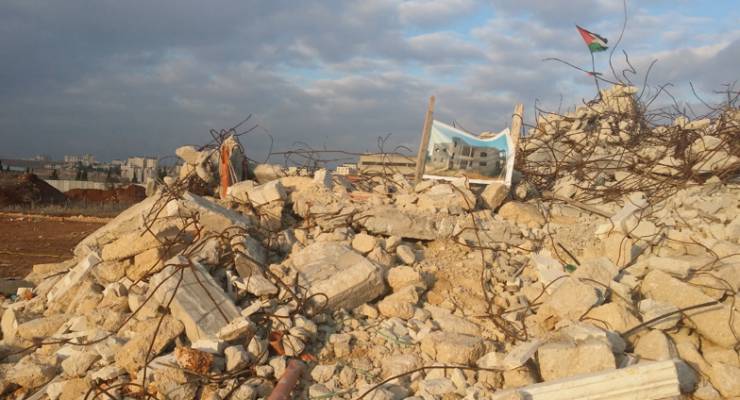
An illegally built Palestinian house that was demolished. Photo: Bernard Keane
For years, the Jewish Board of Deputies and the Australian/Israel and Jewish Affairs Council have sponsored Australian journalists on lavish trips to Israel to take in one of the Middle East’s most prosperous societies. But this year there was a study tour of rather a different sort — journalists, including our own Bernard Keane, were invited to see the same territory through Palestinian eyes.
Though many who attend the Israeli junket attest strongly to their value, critics (including yours truly) argue that by attending, journalists play into and benefit from the (more powerful) Israeli side’s battle to influence public opinion. By taking journalists on regular junkets, the Israeli lobby can ensure its side of the argument is, at least, sympathetically presented to journalistic opinion-makers in Australia.
But this year, Australia’s Palestinian community has funded their own study tour, which concluded Monday. Journalists from Fairfax (Mark Kenny), News Corp (Dennis Atkins), The West Australian (Andrew Tillett), AAP (Rashida Yosufzai), New Matilda (Chris Graham) and Crikey (Bernard Keane) spent time in Jerusalem, Ramallah, Bethlehem, Hebron, Haifa, Nazareth, Nablus and Tel Aviv. A planned visit to the Gaza strip had to be abandoned when the visas didn’t come through on time (a not unusual occurrence). Two of the journalists attending had previously attended trips organised by the Israeli lobby.
The Palestine trip was funded by the Australia Palestine Advocacy Network and conceived of by Peter Manning, a UTS journalism professor and former ABC news director who also attended the trip.
“There have been hundreds of similar trips in Australia organised by various groups within the Israeli lobby structure,” Manning told Crikey. “There’s only really one organisation — the Australian Palestine Advocacy Network — that lobbies in Canberra for Palestine.”
“One of the things it does is have study tours of Israel/Palestine. It was my idea, since I’m a journalist, to get a group of journalists together and have a specialised tour for them.”
Manning says the idea came out of a discussion with journalists at Parliament House’s Aussie’s cafe. More than half a dozen journos immediately expressed interest in attending any such trip. It took about 18 months to plan the tour and organise the money to fund it.
“We went around the Arab community, and Palestinian community in particular, and basically put our hands out. We said it was a specialist media contingent. We got a good response. Of course we flew economy rather than business, and stayed in four- rather than five-star hotels. It was done on moderate expenses. Nonetheless, it was a good program.”
Participants spent 60% of their time in the Palestinian territories and 40% in Israel during the trip, which started in early December and has just concluded. Based most in Jerusalem while taking day trips around the country, they spoke to journalists from Palestinian and Israeli outlets, economists, business owners, activists, aid organisations and government officials. Manning says the trip was “very much more about seeing the occupation in operation, rather than just talking about it”. “I gather that the Israel lobby does a lot of seminars about foreign policy, Israel’s place in the world. We didn’t do that at all. If there was one overarching objective, it was to show journalists what the occupation means on the ground.”
Manning says he viewed the tour as a counter-weight to some of the Israeli efforts in the area. He cites polling that shows Australian public opinion is shifting — likely to take a more sympathetic view than in the past towards the plight of the Palestinians, and a more critical view of the continued existence of settlement activity in Israel. “There is a broad sweep towards Palestine in the community. And we were trying to represent that by pointing out a whole lot of things and letting journalists see for themselves, by talking to experts and having rich experiences, how Australians might feel that way, and how that narrative should be represented in the media.
“There’s no way the Palestine lobby has the resources and money to take on the Israeli lobby — it’s much more powerful, and has been doing this stuff for decades. But this one tour was very successful. And I think people appreciated it, and saw a lot that opened their eyes.”
Of course, any tour (or junket, to use the more pejorative description) could be argued a public relations exercise, aimed at highlighting one side of the conflict over the other. Manning understands the criticism, but he says the journalists on the tour are intelligent enough to manage it. “These were top people who came. And nothing was demanded of them, by me or APAN. No one was asked to go and write anything. That’s not our style.”








Why did no one from the ABC or SBS go on the tour?
That was a rhetorical question, right? Just checking.
Let’s not forget that the amerikan evangelical crazies are one of the most vociferous supporters of Israel but not for reasons which would cheer up anyone with a shred of decency – they’re looking forward to Armageddon (the flat lands & plain of Geddon) and the Drumpfster may be just the lad to bring it about.
Meanwhile, I can’t say that I have seen any result of this eye opening tour in our slavishly proZionist media.
Just as an angle on this, there are lots of foreign government sponsored trips for all sorts of people. It would be good to do a story on how many senior Commonwealth Public Servants have been on trips payed for by the US Government for instance.
Good to see. The more information we get from both sides the more accurate and balanced our perception.